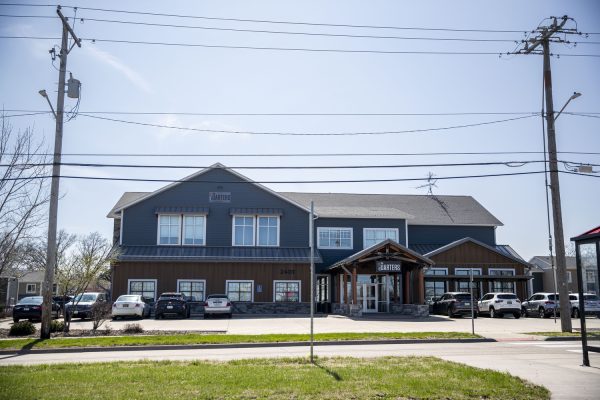After being diagnosed with a disability in May 2024, former University of Iowa student Elizabeth Baumann moved back home to Colorado Springs, Colorado, to receive treatment.
She eventually had to withdraw entirely from the UI, but moving home proved more difficult than she expected. Baumann, who had signed a lease for the 2024-25 school year, couldn’t get out of her agreement despite her new diagnosis.
Baumann had planned to live at The Quarters in east Iowa City. After learning she’d have to stay in Colorado indefinitely, she said she emailed The Quarters general address repeatedly throughout the summer before her lease term began in August, but to no avail.
“I called them like every week,” Baumann said. “I never heard a reply. I started calling them almost every day, and on Aug. 12, I finally got an email back saying, ‘Hey, we can’t get you out of the lease.’”
Because of her disability, Baumann said she responded to her landlord, explaining she could no longer climb the stairs to enter the building or the stairs inside her apartment, but she was still unable to terminate her contract.
Baumann and her family then decided to involve an attorney, who advised her to continue not to make her payments because going to court would be more expensive for both parties than what Baumann’s rent is worth.
“The attorney was, like, ‘Don’t worry about it, just don’t pay them anything. It’s not worth it for either of you to go to court,’” she said. “I haven’t heard anything back from them, but my name is still under the lease, and they just refuse to really do anything.”
The Quarters has not responded to The Daily Iowan’s requests for an interview.

campus that has studio one, two, and three bedroom apartments. (Cody Blissett)
Many UI students rent through leasing companies such as Apartments at Iowa, Apartments Downtown, and Apartments Near Campus — all three of which are owned by the Clark family. The family has been the defendant in several lawsuits against its LLCs, such as an employee dying on the job and a class action lawsuit involving thousands of tenants who were required to pay false maintenance fees.
Running into issues like Baumann’s is common for UI students, who are often first-time renters. To address these challenges or answer questions, the university offers all students free legal advice and representation.
The search for solutions
Amanda Elkins, the director attorney of Student Legal Services, said the top renters’ issues for undergraduate and graduate students she dealt with in fiscal 2024 were lease terminations, getting back security deposits, and maintenance issues. She said the office also received many requests to review leases before students sign or look over charges and fees the tenant doesn’t understand.
Elkins said the office has received several requests for assistance regarding issues with the three Clark family-owned companies. However, she said since the companies are so large, the scale of the complaints they receive is skewed.
Elkins highlighted some success stories in the past fiscal year where Student Legal Services, or SLS, was able to negotiate a $12,000 maintenance charge to $4,000 for a student. SLS also got a landlord to back down after charging tenants for utilities despite utilities being included in their lease agreement.
To avoid these situations, Elkins said the best thing a student can do before finding a place to live is to research, whether that be speaking to tenants who already live in the building or searching the property on the Johnson County Inspector’s website.
“Part of our job is helping students after things have happened, but we also try to do preventative education,” she said. “When you fill out a rental application, the landlord is assessing you, but you should be assessing the landlord, too.”
In addition to Student Legal Services, the UI Undergraduate Student Government also provides resources for students who are on the house hunt.
Every year, the UI’s Undergraduate Student Government, or USG, sends out a survey collecting demographic information and information about landlords’ cooperation and attentiveness as well as property maintenance or safety concerns.
According to USG’s 2024 survey results, 72 percent of UI students live off campus, and about 25 percent of students who answered the survey are international, transfer, first-generation, veteran, or non-traditional students.
Ava Martinez, USG’s deputy city liaison, said they attend all Iowa City City Council and Downtown District meetings to ensure student voices are represented. One of the issues Martinez said they deal with is ensuring fair, equitable access to housing for students.
One instance that has drawn their attention is the 21 S. Linn St. lot, which is currently empty.
“The city, they love the university, but they are really determined to make sure that it’s not overrun by us,” Martinez said. “They actually purposely put it in a clause for people who want to make a proposal in that spot that it can’t be luxury student housing. We want to make sure that they know that students have to live out in the city.”
Lowering renters’ costs and providing protections for renters have been priorities for Iowa’s Democratic lawmakers this legislative session.
Iowa House Rep. Elinor Levin, D-Iowa City, introduced a bill to cap the amount a landlord can increase rent on current residents in rental units, manufactured home communities, or mobile home parks.
House File 740 was never referred to a subcommittee and did not survive through the first legislative funnel, so it is no longer viable to be made into law.
Levin, who rented for over 10 years before becoming a homeowner, said it is both “predictable and very disappointing” that the legislation was struck down.
“I think owning a home as the American dream continues to be so present because of that feeling that, well, ‘If I own my own home, I know that maintenance will be done on my schedule. I know that I can predict the bills, I know that I can decide to make a change to my electrical use or to the utility company through which I received my internet, and it will finally be up to me,’” Levin said. “That comes from some of those negative experiences that folks have in their rental experience, and I just don’t think it needs to be that way. There is an option for a good rental experience, and it would help if we had more proactive policies in place to support that system.”
Other legislation that did not pass the legislative funnel would:
Require landlords to refund 50 percent of potential tenants’ application fees if their applications are denied
Create land development trusts and housing trust funds
Require the Iowa Finance Authority to create a forgivable loan program to help homeowners renovate and upgrade their homes.
“We’re not necessarily always talking about students,” Levin said. “We’re talking about people who are planning to be lifelong renters, and we’re talking about people who are planning to be renters for the next foreseeable future — say four or five years — and they need to know that they can budget for those expenses.”
Levin said introducing House File 740 was important to her because renters living in manufactured home communities and mobile home parks have been victimized, and she wants to draw attention to massive lot rental increases, reductions in services, and aggressive strategies taken by some property owners.
She said these actions are worrisome, considering manufactured homes and mobile homes are the answer to affordable homeownership in many places.
IC family struggles with landlord change
A long-term Iowa City renter and 42-year-old resident came home to a 90-day notice to vacate — the step before eviction — taped to the front door of her family’s single-wide mobile home in Breckenridge Estates, south of Iowa City. The DI granted the source anonymity upon request due to eviction concerns.
The renter and her family of five might have to vacate their home in May. The notice to vacate followed a request for the family to clear their lawn, as they had equipment and machinery stored in the backyard.
She said her husband owned an auto repair shop that was closed down, so he’s been working from home until he can find another place to rent and set up a shop.
Following the first notice, the family organized the equipment and secured it under a tarp. Weeks later, they received another notice that a hauling company would arrive and give an estimate on how much it would cost to haul the equipment away.
RELATED: Johnson County committee works toward housing assessment need study
The renter said she never received an estimate. Instead, she came home to the 90-day notice to vacate taped to her family’s front door on Feb. 11.
“I don’t even know how to make sense of this,” she said.

She first moved to Breckenridge Estates in 2012, when a private landlord owned the mobile home park. The renter noticed a shift when Impact Communities — one of the industry’s largest owner-operators of manufactured housing communities in North America based out of Colorado — purchased the park roughly five years ago.
When the park was privately owned, she said the previous owner was always on-site, making repairs, and was friendly with all the residents.
The park felt more like a community under the previous owner, she said, and now there is no way to contact the owner. An office manager is available to renters four days a week but is often hard to get a hold of, she said.
“I feel like the corporate owners and management, they don’t seem to care as much,” she said. “It’s all about, ‘Pay your rent or you’re out, and we don’t care about what’s going on on your lot or your property.’”
After receiving the notice to vacate, she reached out to the property manager and found out the notice came from a district manager, however, she said there was no way for her to reach the district manager directly.
“I didn’t even know that [the district manager] existed until a few weeks ago, but it just seems like they’re really cracking down on things that we never really had to worry about before,” she said.
She also said her rent has increased each year since Impact purchased the park. The company increased rent twice in its first year of owning the park and then about once a year every year since.
The renter paid $260 a month when she first moved in 12 years ago. Her rent has increased by nearly $500 dollars, rising to roughly $730 a month.
She said mobile home parks used to be low-income housing for the area, and now more and more people can’t even afford the lot rent.
The average lot rent in Breckenridge Estates is $634 per month, according to availability postings on its website. Breckenridge Estates did not respond to the DI’s request for comment.
The family is navigating their options as the May 11 deadline to vacate approaches.
“We’ve been looking for a place to go, just in case they decide to evict us after all,” she said. “But because we have poor credit, not a lot of income, it’s just kind of hard for people to approve us for renting.”



